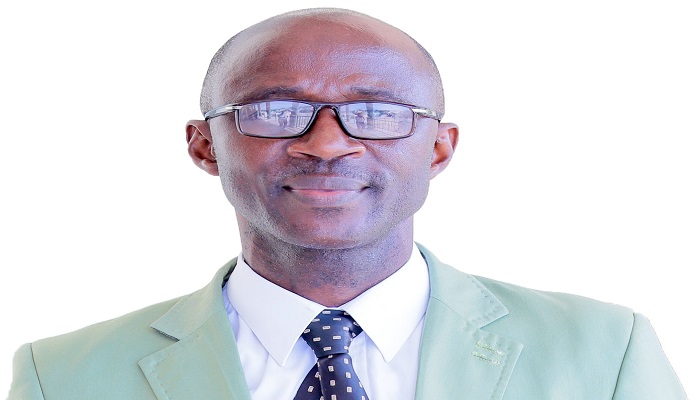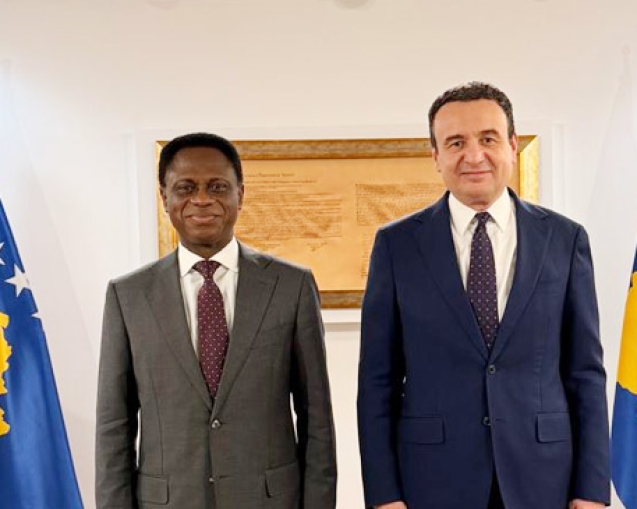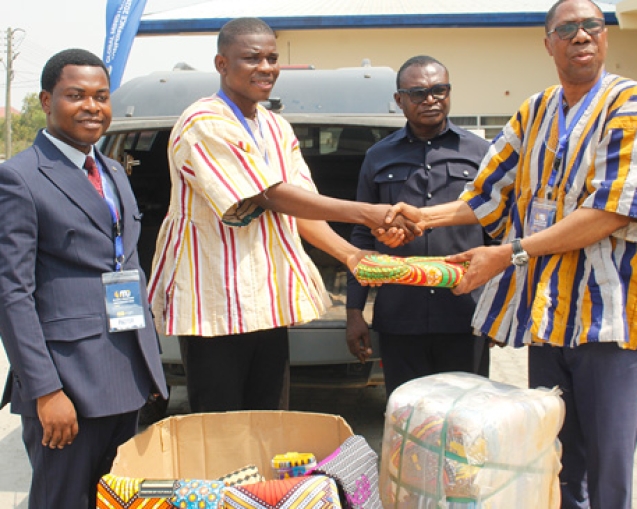By Apostle Vincent Anane Denteh.
Since October 2019, the media waves in Ghana have been awash with hysteria, fury, and fierce debate about the introduction of a policy called Comprehensive Sexuality Education (CSE) in the Ghanaian educational system.
There have been quick reactions from civil society in Ghana, including the National Coalition for Proper Human Sexual Rights and Family Values (NCPHSRFV), the Christian Council of Ghana (CCG), the Ghana Pentecostal and Charismatic Council (GPCC), Ghana Catholic Bishops Conference, The Office of the National Chief Imam (ONCI) among others. One crucial issue running through most of the debate is that the Comprehensive Sexuality Education is an “evil” attempt by the international community, particularly some Western nations to de-culturalise Ghanaians to give way for negative Western cultural values and ideologies to prevail in Ghana.
The public expressed outrage on deducing that the CSE programme is a step toward the indoctrination of Ghanaian youngsters to embrace Lesbian, Gay, Bisexual, Transgender, and Queer or Questioning (LGBTQ) beliefs. However, government agencies have denied the inclusion of any LGBTQ agenda in the curriculum. The Ghana Education Service argues that the curriculum has not been approved so there is no cause for alarm, but many Ghanaians appear to have rejected that line of argument. This situation has, therefore, become so critical that it has compelled the government through the Ministry of Education and Ghana Education Service to suspend the programme.
To this end, some people and agencies like the NCPHSRFV and GPCC have argued that the CSE programme should be withdrawn completely from the Ghanaian educational curricula. They argue that suspending it is not enough because it may be re-introduced later on the blind side of the general public. Others also think that just changing the name, Comprehensive Sexuality Education to another term is equally not the best solution as long as the content of the programme remains unchanged. Some Ghanaians are also of the view that sex education has always been part of our educational system. Therefore, there is no problem teaching sex education as the case has always been, but the CSE programme is a different concept altogether. The comprehensiveness in the whole concept with the CSE programme is the cause of worry because the issue of Comprehensive Sexuality Education, in their opinion, is not the same as sex education.
For some Ghanaians, the policymakers in Ghana assigned to develop the CSE material are not the only culprits in this matter. They blame the United Nations agencies such as United Nations International Children’s Emergency Fund (UNICEF), United Nations Population Fund (UNFPA), and United Nations Education, Scientific, and Cultural Organization (UNESCO). UNESCO launched the programme (dubbed: Our Right, Our Lives, Our Future [O3]) in Ghana in February this year. The programme is reported to be supported by Sweden and Ireland. Many Ghanaians argue that these agencies may be the brain behind the global introduction of the Comprehensive Sexuality Education which Ghana is allegedly trying to adopt. Responding to the debate at the St. Cyprian Anglican Church in Kumasi on October 6, 2019, the president of the Republic of Ghana, H.E. Nana Addo Dankwa Akufo-Addo emphatically stated that his government will not endorse the teaching of “unnecessary things” in the Ghanaian educational system. He followed up with a press conference during his meeting with the clergy in Kumasi. Many Ghanaians appear to appreciate his intervention and effort in coming out with this statement.
Ghana’s Commitment to the Sustainable Development Goals (SDGs) of the United Nations
Ghana as a member state of the United Nations (UN) is also committed to fulfilling the charters endorsed by various UN agencies such as the UNESCO, UNICEF, and UNFPA among others. One of the most significant programmes of the UN and its agencies in contemporary times is the seventeen Sustainable Development Goals (SDGs) endorsed by member states in September 2015. Every member state has been tasked to fulfil her commitment towards the Sustainable Development agenda projected deadline of 2030. Ghana, therefore, has the commitment, as a member nation to fulfil her portion of this all-important global agenda. It has to be reiterated that the SDGs are a very important development agenda for our contemporary world that should not be underestimated.
It is in the light of this that, UNESCO, UNICEF, and UNFPA appear to be guiding Ghana to adopt a standardised sexuality and reproductive health education (the O3 programme as stated above) to aid the Ghanaian population, particularly the youth to confront contemporary sexuality and reproductive challenges facing humanity. I think this on its peripheral value should not raise eyebrows. However, many Ghanaians are skeptical about the source and motivation of the programme arguing that there are ungodly strings attached to it as indicated above. Some are also concerned that, the extension of the CSE programme to include children and young people is unacceptable in the Ghanaian culture. Another side of the argument is that we are not ready as a nation for any aspect of teachings about alternative sexual orientations even at any level of the Ghanaian educational system; including any kind of Family Planning education. This argument tends to suggest that, the whole of the Ghanaian cultural system rejects in totality the CSE programme as expected to be run by our international partners. The general public will only be satisfied if the programme is re-designed in conformity with the Ghanaian cultural values and societal norms.
Has the Issue been Resolved?
It is felicitous to say that the debate has not yet completely settled the issue despite the fact that the government has declared its position on the matter now. For now, it appears there is a “tactical retreat” by government and our policymakers but what is the way forward? It is still a topic of discussion in both the media and the Ghanaian society. The reason might be attributed to the way the issue has been handled by both government officials and the general public. While some people have been so furious that they do not even want to brainstorm any solution to help resolve the situation some government officials who have taken an entrenched position in defending the policy are not also helping. The defence of some of them appears to be very contradictory. Another unfortunate part of it is the involvement of some members of the diplomatic corps who joined the debate and appear to use expressions that inflamed passions. A typical example is a statement by the country director of the UNFPA, Niyi Ojuolape. He said, “It is a misnomer. It is actually arrogance of opinion to think that you would know what is better to do than the practitioners who are also Ghanaians” (Ghanaweb, October 1, 2019). This statement, if he really said so, obviously did not go down well with many Ghanaians.
Another serious aspect of the debate, which I think should not be entertained at all is the politicisation of the situation. This will not help for a wider discussion of the issue by many Ghanaians. Some have the desire to speak to national issues as long as the issue at stake is in the interest of all Ghanaians but would not want to side with any particular political party. During their press conference, the GPCC also cautioned Ghanaians not to politicise the debate and this, I think, is a laudable advice. Our policymakers may need our inputs in this issue as good citizens so let us be neutral and help them to find a lasting solution to the issue.
As a member state of the United Nations who has endorsed the implementation of the SDGs, what should Ghana do as a nation in the face of this CSE programme? Meanwhile as a nation, our primary responsibility is to uphold our cultural, moral, and religious values albeit in the midst of our global commitments. It needs to be made clear here that we cannot live in isolation as a nation from the global stage, yet at the same time, we cannot also hide behind globalisation to compromise our cultural and religious values. Every nation has its own cultural identity and Ghana is not an exception. What then is the way forward about all the brouhaha concerning this Comprehensive Sexuality Education and its related programmes from foreign agencies? I propose “Contextualized Sexuality Education”, in name and in content – that is, contextualized instead of just comprehensive. It may also be Indigenous Sexuality Education (ISE) as an alternative expression of the Contextualised Sexuality Education.
Contextualised Sexuality Education (CSE) or Indigenous Sexuality Education (ISE)
Taking into account that we cannot avoid contemporary sexuality challenges completely, there is the need to explore how best the programme can be contextualised for our people in this country so that other countries where this issue is creating pandemonium can also learn from us. In my opinion, the Comprehensive Sexuality Education as rolled out by the global community should be contextualised in Ghana under the name, Contextualised Sexuality Education (which is also, CSE). To put it in a different way, which also may mean the same, we may opt for Indigenous Sexuality Education (ISE). Thus, we will be using the CSE or the ISE interchangeably or both. Our indigenous CSE programme should be designed in such a way that everything about sexuality education in the nation would resonate very well with our shared but diverse cultural, traditional, moral, and religious values.
We do not need comprehensive sexuality education from a foreign perspective. Issues about sexuality cannot largely be universal and that is why this author appears to present contextualisation as the alternative to the issue at stake. Contextualisation in this sense does not mean rejection of the concept of sexuality education, but means doing it in our own way, understanding, our cultural identity. Checks from the media indicate that there are protests across the world about the implementation of the Comprehensive Sexuality Education and I think the issue can only be settled with the adoption and implementation of the Contentualised Sexuality Education as suggested in this article.
The Framework of the Contextualised Sexuality Education programme
Our Contextualised Sexuality Education or Indigenous Sexuality Education (ISE) should be designed to deconstruct the definitions of certain terms that have been constructed from the perspective of postmodernists and secular humanists of our day. For example, our age-long understanding of sexuality has always been based on two gender groups – who are born biologically female and male. In our culture, gender is considered a natural phenomenon identified right from birth. When someone brings forth a child, we normally ask: a baby girl or boy? We do not expect alternative sexual orientation to these two gender groups in the Ghanaian cultural system. It is not our cultural practice to allow a person to grow up into adulthood before deciding which type of gender group they intend to belong. Of course, cases of those born with both genitals (Hermaphrodite) are treated through medical procedure and that is an exception. The import of this argument is that gender orientation from our cultural perspective is not a matter of choice or emotion by an individual or through an ideological reason, but an act of God – by default. The examples can go on and on.
Exclusion of Illicit Sexuality Education
The issue of illicit sexual activities and varied orientations of the LGBTQ community that constitute unnatural canal sex is an affront not only to the laws of Ghana, but also the tenets of our cultural and religious values. No unnatural canal sexual orientation should be included in our educational curriculum under ISE programme. All the terms captured in LGBTQ acronym and other emerging sexual orientations from Western perspective should be stated in our contextualised programme as unacceptable and illicit sexual orientation in the Ghanaian culture. Our youngsters should be taught in our educational curriculum to understand that those things really exist in this postmodern world, but they are unacceptable in our culture and the religious values of the country. Making them aware of their existence is good, but they should not be encouraged to practice in our culture. This is the indigenisation aspect of CSE programme and peculiar by its characteristics that others can learn from.
Our professionals, technocrats, the clergy, and traditional rulers should be empowered to design a contextualised approach to help youngsters combat or avoid contemporary sexually-related challenges such as sexually transmitted diseases, rape, and other illicit sexual practices that the UN is concerned about. We can handle the situation from our own indigenous perspective so there is no cause for alarm provided our policymakers have the political will to do so. We have the human resource that can help us to design this Contextualised Sexuality Education (CSE) programme which will be consistent with our values without any outside interference whatsoever the case may be.
Ghanaians as the Custodians of our Culture
It should also be inserted in our indigenous CSE programme that the Ghanaian society is the custodian of our culture and maybe judgmental of any negative disposition of our cultural values. Inserting this clause in the CSE will help to address the confusion in the drafted CSE guidelines of the Ghana Education Service. They have indicated in their foreword that young people will be able to “nurture positive attitudes and values including open-mindedness, respect for self and others… non-judgmental attitude [emphasis mine], sense of responsibility concerning their sexual and reproductive health issues” (Guidelines for Comprehensive Sexuality Education in Ghana, 2019:4). What does this mean? In the Western world, no person (including one’s parents or pastor) would dare be judgmental or concerned about children or people’s expression of their sexual orientations. Is that what should be replicated here in Ghana as appeared in the CSE guidelines? No!
Even the UN has given the option to every member state to design the Comprehensive Sexuality Education programme in accordance with its own cultural values, beliefs, and societal norms. If that is the case, then the suggestions of this author for us to change the name and content from Comprehensive Sexuality Education (CSE) to Contextualised Sexuality Education (the same CSE) is not a misnomer. Our policymakers will only have a backlash from the general public if they want to force down our throats the carbon-copy of the CSE from Western perspective where issues about the LGBTQ are taught subtly as if they were new phenomena of sexual orientations that should be accepted as normal in Ghana. It has been clear from the debate that the Ghanaian public will never accept it, but having an indigenous approach to it may pass the test. Thus, we already have Religious and Moral Education (RME) being taught in our schools. The curriculum may be restructured to include the Contextualised Sexuality Education or we make it a new subject altogether, but MUST be contexualised and consistent with our values and beliefs as argued throughout this article.
In conclusion, it has been noted that the interplay between culture and globalisation has left humanity with various challenges, including the issue of sexuality and culture. At times, humanity becomes confused as to which type of moral values and virtues to be adopted. It, therefore, calls for every nation and people to brace themselves for this challenge and find an indigenous approach towards the situation. As global influence appears to be pitching us against our own cultural values and beliefs, it is about time we designed a standardised legal framework as well as a guideline for the expression of our cultural values and societal norms.
We should not be passive. Once it is a standardised and contextualised guideline, people with various ideologies will find it difficult to infiltrate our social fabric to destroy our values and beliefs. However, if we reject reality about contemporary social developments, it means there is still a vacuum to be filled and that can make secular humanists and external forces jump into the vacuum with their ideologies to dictate to us. The time to consider the dynamism of culture in the light of our global commitments is now. Perhaps God has used this CSE uproar as a wake-up call to all of us to start thinking about how to handle culture and postmodernity. This is why Contextualised Sexuality Education (CSE) could be the best option as presented in this article.
Author’s Contact Details: The author is a minister of The Church of Pentecost. He is a trained journalist and an author of ten books to his credit. Email: vadentcop@gmail.com, Cell phone: 0505654402.
DISCLAIMER: This article is the personal opinion of the author.


















